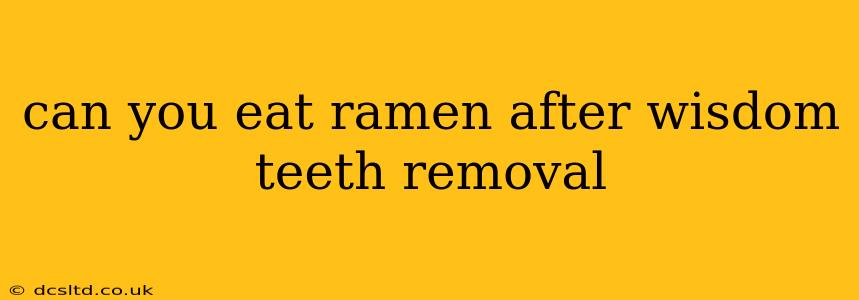Can You Eat Ramen After Wisdom Teeth Removal? Navigating Your Post-Surgery Diet
Having your wisdom teeth removed is a significant procedure, and recovering properly involves careful attention to your diet. Many people wonder about their favorite foods, and ramen, with its comforting broth and noodles, often tops the list of post-surgery culinary questions. The simple answer is: it depends. While ramen might seem appealing, its suitability after wisdom teeth extraction hinges on several factors. Let's delve into the details.
What Can I Eat After Wisdom Teeth Removal?
Immediately following wisdom teeth removal, your diet will be extremely restricted. Your dentist or oral surgeon will likely recommend a liquid or pureed diet for the first few days. This is crucial to prevent disturbing the blood clots forming at the extraction sites and to minimize pain and discomfort. Think smoothies, soups (without chunks), applesauce, and yogurt.
As the healing process progresses, you can gradually introduce softer foods. This is where the ramen situation becomes a bit more nuanced.
Can I Eat Ramen Noodles After Wisdom Teeth Removal?
The noodles themselves, when fully cooked and soft, are generally okay once you've progressed beyond the initial liquid diet phase. However, the key lies in the other ingredients:
-
The Broth: This is the main point of contention. Hot broth can dislodge blood clots, leading to dry socket (a painful complication). Additionally, some broths might contain small particles or spices that can irritate your wounds. If you choose to consume ramen, let the broth cool completely before drinking. Opt for a broth that’s very smooth and free of chunky vegetables or seasonings.
-
Toppings: Avoid any toppings that are crunchy, hard, or require significant chewing. This includes things like crispy onions, hard-boiled eggs, or even some types of meats. Stick to very soft or easily mashed toppings, if any at all.
What Kind of Ramen is Best After Wisdom Teeth Removal? (If any)
If you’re determined to have ramen, choose a variety with very soft, well-cooked noodles and a very smooth broth. Consider making your own ramen from scratch to better control ingredients. You can use very finely chopped, incredibly soft vegetables, if desired.
Is Instant Ramen Okay After Wisdom Teeth Removal?
Instant ramen often contains harder noodles, and the broth might contain small particles that could irritate the extraction sites. While technically possible later in the healing process, it's generally not recommended due to the risk.
When Can I Eat Normal Ramen After Wisdom Teeth Removal?
The timeline for returning to a regular diet varies from person to person. It depends on the complexity of the surgery, the healing process, and your individual tolerance. Most people can transition to a more normal diet after a week or two, but always listen to your body and your dentist’s recommendations. Once your wounds have fully healed and you no longer have significant pain or swelling, you should be able to enjoy your ramen without any issues.
What Foods Should I Avoid After Wisdom Teeth Removal?
It's important to avoid:
- Hard foods: Anything that requires significant chewing, like chips, crackers, nuts, or raw vegetables.
- Spicy foods: These can irritate the sensitive extraction sites.
- Acidic foods: These can also irritate the wounds and delay healing.
- Extremely hot or cold foods/drinks: Temperature extremes can cause pain and discomfort.
Ultimately, patience and careful consideration of your diet are crucial for a smooth recovery after wisdom teeth removal. If you’re unsure about a particular food, it’s always best to err on the side of caution and consult your dentist or oral surgeon. Your comfort and successful healing are paramount.
